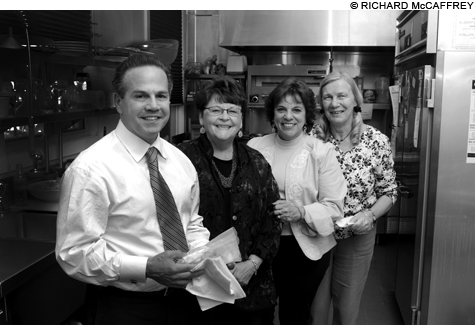
ON THE GROUND Cicilline is wooing women voters. His political survival may depend on it. |
Standing before a crowd of about 100 at a fundraiser at The Dorrance bar and restaurant in downtown Providence a couple of weeks ago, Planned Parenthood president Cecile Richards left little doubt about her organization's top political priority in Rhode Island.
"David Cicilline, our good friend in Congress, is running for re-election," she said, "and we've got to get him re-elected."
The assembled applauded, but it was a bit of an awkward moment: Congressman Cicilline's opponent in the Democratic primary this fall, businessman Anthony Gemma, was standing just a few feet away.
The challenger, though, had to know what he was getting into when he walked through The Dorrance's heavy, revolving doors.
Cicilline, facing the political fight of his life, is doing all he can to harness outrage over the Republican Party's so-called "war on women" — the push to defund Planned Parenthood, the failure to reauthorize the Violence Against Women Act, the opposition to the Paycheck Fairness Act.
And little wonder.
In a May poll commissioned by WPRI-TV that gave Cicilline a small lead on Gemma in the primary, it was women who put him over the top. And in an earlier WPRI poll that had Cicilline 15 points behind GOP candidate Brendan Doherty in a general election match-up, it was women who kept him within striking distance.
The math, for the incumbent, is pretty clear: win women by a significant margin and he probably returns to Congress. Fail and he almost certainly goes home.
TRUST VS. DEMOGRAPHICS
That a Democratic incumbent in a deep blue state would face such a stark challenge is still a little stunning. But Cicilline, of course, has committed one of the great sins of modern American politics: shaking the voters' trust.
The story, by now, is a familiar one.
Cicilline was serving as mayor of Providence when he launched his first Congressional bid in 2010. And he famously said the city was in "excellent" fiscal condition during the campaign.
After the election, when his City Hall successor Angel Taveras declared a "Category 5 hurricane" on the capital's books, the freshman Congressman's approval ratings went kablooey.
His early attempts to push back against the story, followed by a belated not-quite-apology tour, have done little to restore his reputation. And that means Cicilline's re-election strategy has more or less boiled down to this: smother the trust problem with an appeal to a few key demographics.
He has to turn out Latinos, who became a much bigger factor in the race after Cicilline grabbed the south side of Providence during a contentious redistricting fight this winter. And he has to turn out young voters, who favored him over Doherty by almost 20 points in that otherwise dismal WPRI survey.
Both groups are notoriously difficult to get to the polls, though. And that makes women, who consistently make up more than half the Rhode Island electorate, Cicilline's most important target. The Congressman, facing a pair of pro-life opponents, is courting them assiduously.